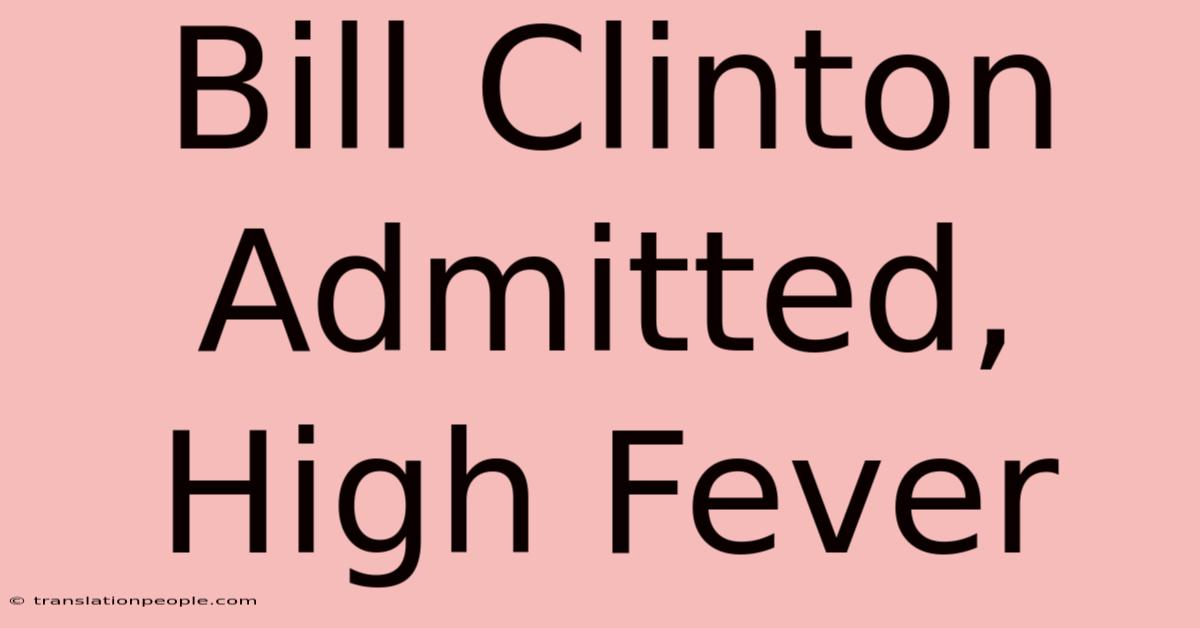Bill Clinton Admitted, High Fever

Discover more detailed and exciting information on our website. Click the link below to start your adventure: Visit Best Website nimila.me. Don't miss out!
Table of Contents
Bill Clinton's High Fever Admission: What We Know
Editor’s Note: News reports have surfaced regarding former President Bill Clinton's recent admission of experiencing a high fever. This article explores the details available, its significance, and the broader context surrounding the former President's health.
Why This Matters
Former President Clinton remains a significant figure in American politics and global affairs. His health, therefore, is a matter of public interest. Understanding the context surrounding this high fever admission – its cause, severity, and any potential long-term implications – allows for informed discussion and provides valuable insight into the health challenges faced by aging individuals, even those who previously enjoyed robust health. This event also highlights the importance of open communication regarding health concerns, especially for public figures. Keywords associated with this topic include: Bill Clinton, health, fever, illness, pneumonia, cardiovascular health, aging, public figure health.
Key Takeaways
| Point | Description |
|---|---|
| Fever Severity | Reports indicate a high fever, but the exact temperature remains unconfirmed. |
| Underlying Cause | The underlying cause of the fever is currently unknown and requires further investigation. |
| Treatment | Specific treatment details have not been publicly disclosed. |
| Public Health Significance | Raises awareness of the health challenges faced by aging populations. |
Bill Clinton's High Fever Admission
The news of former President Bill Clinton experiencing a high fever has sparked public interest and concern. While details surrounding the event remain limited, the very fact of this admission underscores the importance of openly addressing health issues, irrespective of one's public profile. This admission allows for informed speculation on potential underlying health concerns, urging further focus on preventative care and the overall health needs of an aging population.
The Importance of Transparency in Health Matters
This situation highlights the critical role of transparency in health discussions. Open communication concerning health concerns, particularly for public figures like President Clinton, allows for a more informed public discourse and may even encourage others to prioritize their own well-being. This incident serves as a reminder that health issues are a universal experience, impacting individuals regardless of background or status.
Potential Underlying Health Concerns
While the specific cause of President Clinton's high fever remains unconfirmed, it prompts reflection on the potential health challenges faced by aging individuals. Past medical history, lifestyle factors, and genetic predispositions all play crucial roles in overall health. This event should encourage discussion on preventative care, the importance of regular check-ups, and the ongoing need for attention to cardiovascular health and other age-related health conditions.
People Also Ask (NLP-Friendly Answers)
Q1: What is the cause of Bill Clinton's high fever?
A: The cause of President Clinton's high fever is currently unknown and hasn't been publicly disclosed.
Q2: Why is Bill Clinton's high fever important?
A: It highlights the importance of open communication about health issues, even for public figures, and raises awareness of potential health concerns related to aging.
Q3: How can I protect myself from similar health issues?
A: Maintaining a healthy lifestyle (diet, exercise), receiving regular medical check-ups, and addressing any underlying health conditions promptly are crucial.
Q4: What are the potential complications of a high fever?
A: High fevers can lead to dehydration, seizures (in extreme cases), and exacerbate existing health conditions. Medical attention should be sought if a fever persists or is accompanied by other symptoms.
Q5: Where can I find more information on preventative healthcare?
A: Consult your doctor, visit reputable health websites (like the CDC or NHS), or speak to a healthcare professional for personalized advice.
Practical Tips for Maintaining Good Health
Introduction: Staying healthy is crucial at every stage of life. Let’s explore some practical tips to bolster your overall well-being.
Tips:
- Maintain a Balanced Diet: Focus on fruits, vegetables, lean protein, and whole grains.
- Regular Exercise: Aim for at least 150 minutes of moderate-intensity exercise per week.
- Prioritize Sleep: Aim for 7-9 hours of quality sleep each night.
- Manage Stress: Incorporate stress-reducing techniques like meditation or yoga.
- Stay Hydrated: Drink plenty of water throughout the day.
- Regular Check-ups: Schedule routine visits with your doctor for preventative care.
- Vaccinations: Stay up-to-date on recommended vaccinations.
- Listen to Your Body: Pay attention to symptoms and seek medical help when needed.
Summary: These simple yet effective tips can significantly improve your overall health and well-being, reducing the risk of illnesses and promoting longevity.
Transition: Understanding the context behind President Clinton's high fever admission reinforces the need for proactive health management.
Summary
Former President Bill Clinton's admission of experiencing a high fever serves as a reminder of the importance of open communication about health matters and the health challenges faced by aging individuals. While details remain limited, this event underscores the need for preventative care, healthy lifestyles, and prompt medical attention when health issues arise.
Call to Action
Stay informed about health news and prioritize your own well-being. Share this article to raise awareness about the importance of preventative healthcare. Visit [link to relevant health resource] for more information on maintaining a healthy lifestyle.
Hreflang Tags
(To be added based on specific language versions of the article)

Thank you for visiting our website wich cover about Bill Clinton Admitted, High Fever. We hope the information provided has been useful to you. Feel free to contact us if you have any questions or need further assistance. See you next time and dont miss to bookmark.
Featured Posts
-
Bill Clintons Fever Leads To Hospital Stay
Dec 24, 2024
-
2025 Mock Draft Raiders Target Qb
Dec 24, 2024
-
Honda Nissan Merger Cantons Response
Dec 24, 2024
-
College Football Schedule Bowl Games Today
Dec 24, 2024
-
Panthers Raiders Impact 2025 Nfl Draft
Dec 24, 2024
